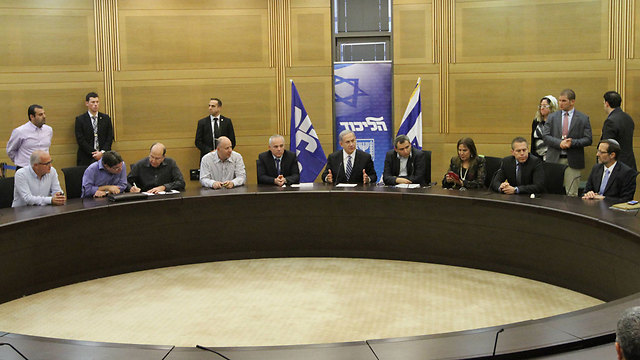
Likud plans to cancel 18-ministers limit, as party MKs vying for jobs
Unofficial coalition negotiations are underway, with Likud MKs squabbling over the main portfolios and Lieberman, Bennett and Kahlon all after highly influential ministries.
Prime Minister Benjamin Netanyahu's Likud party, the big winner of the 2015 Israeli elections, is planning to cancel a law passed in the previous government that limits the number of ministers to 18, even as party members have already started vying for ministries.
After winning a solid victory in the 2015 elections, Netanyahu can form his government with almost no obstacles standing in his way. The re-elected prime minister has already announced he was seeking to form a right-wing government with his natural partners in the national camp, rather than a unity government with the Zionist Union.
The makeup of Netanyahu's coalition is expected to look like this: Likud with 30 seats, Kulanu with 10, Bayit Yehudi with 8, Shas with 7, United Torah Judaism with 6 and Yisrael Beytenu with 6 seats – a total of 67 MKs.
While he is negotiating with other parties on ministries and appointments, the MKs of his own party are already squabbling over their own appointments.
Moshe Ya'alon will likely get to keep the defense portfolio, while Yuli Edelstein will remain as the Knesset Speaker.
If Likud gets to keep the Foreign Ministry, one of the leading candidates for the position would be no.2 on the list, Gilad Erdan, who is considered one of Netanyahu's closest allies. Another candidate for foreign minister is Silvan Shalom, who had the job in Ariel Sharon's government.
If the Likud gets to keep the education portfolio, one of the candidates for the role would be Yuval Steinitz. If Steinitz is promoted, his current job as intelligence minister, along with a membership in the security cabinet, will go to returning Likud MK Benny Begin.
However, in an interview with Israel Radio on Thursday, Steinitz hinted that he was actually interested in the position of foreign minister. "The Likud must hold the foreign portfolio because right now that is really the front," he said.
Just two days after the elections, Steinitz was asked if he would want to be the next foreign minister to which he responded: "It is of course a very very important position, in my eyes it is probably the most important of all positions on the front."
When asked if he spoke with Netanyahu about receiving the position Steinitz said, "I do not speak about my conversations with the prime minister. I think it's a position I am fit for, it fits me. I think that what we really need today is a foreign minister and a foreign ministry that is effective, that know how to make the connections, create ties, to explain Israel and strengthen our ties with the entire world, with the US at the forefront."
Steinitz emphasized that for the past two years he has focused on creating a dialogue with the Americans and the Europeans regarding the topic of nuclear Iran and added that he thinks that there is a lot that can be done to strengthen ties with Europe and the US.
Another Likud veteran, Israel Katz, is also looking for a new job, after serving as transportation minister in the past two Netanyahu governments. During the election campaign, he said he viewed himself as the next finance minister. However, since the Finance Ministry will likely go to Moshe Kahlon and his Kulanu party, Katz could either stay in the transportation ministry or be upgraded to a senior economic position.
The most powerful woman in Likud, Miri Regev, is also looking to climb up the ladder from her role as the chairwoman of the Internal Affairs and Environment Committee. Sources in the Likud party said Netanyahu will likely appoint her as a minister in one of the social ministries.
Other Netanyahu supporters who are expected to reap the benefits of victory and be made ministers are Tzachi Hanegbi, Yariv Levin, Ofir Akunis, Ze'ev Elkin and Gila Gamliel.
Yesh Atid leader Yair Lapid, who pushed to limit the number of ministers in the government to 18 last term, vowed to fight the Likud move to cancel the law.
"We must not expand the government to over 18 ministers. This is your money, these are hundreds of millions of shekels who could go to daycares and to lowering prices," Lapid wrote on Facebook, noting Netanyahu and his entire party voted in favor of that law.
"This is corruption and we'll fight against it in the Knesset and, if necessary, at the Supreme Court as well," he added.
The fight for the most influential ministries
The Likud might have to give up three of the most coveted and influential ministries. Yisrael Beytenu is insisting to keep its election promise to demand the defense ministry for chairman Avigdor Lieberman. If Lieberman gets his wish, Bayit Yehudi chairman Naftali Bennett might demand to have the Foreign Ministry, while Kulanu's Moshe Kahlon will demand to have the Finance Ministry.
Kahlon is also expected to demand two additional economic portfolios, while Lieberman will ask to keep the Immigrant Absorption Ministry for current minister Sofa Landver.
"What's important to us is that from the beginning we didn't hide anything from our voters," Lieberman told Ynet. "It's important to us to stick to the guidelines we published during the campaign. The ministries will wait until we reach an agreement on the guidelines. Among other things, the social legislation we promised is important to us - 90 percent help in mortgage funding for young couples who served in the army and work and lowering VAT on 50 select basic products. Also other topics like the Supreme Court's interference in the Knesset's work, death penalty for terrorists, ect."
Yisrael Beytenu officials also said they will seek clarifications on the new government's position on cancelling the criminal sanctions clause in the Haredi draft law and on funding yeshivas.
"If there's money to bring back benefits and funding yeshivas, they'll have to find money to budget kindergartens until 5pm. It's a question of fairness."
Focusing on social issues
After winning 7 seats in the elections, the Shas party will demand the Interior Ministry for its chairman Aryeh Deri. Unlike his predecessor Eli Yishai, who also served as interior minister, Deri will avoid dealing with controversial issues like the African infiltrators and Daylight Savings Time, and instead focus on social issues. At the top of his priorities is a redistribution of the ministry's resources and budget in a way that favors the periphery.
Shas will insist on three basic conditions to join the coalition: Raising the minimum wage to NIS 30 ($7.5) an hour, cancelling VAT on food ingredients, and allocating 7.5 percent of housing construction to public housing. In order to achieve this latter goal Deri will demand control over the Israel Land Authority.
Shas' election campaign avoided issues of religion and state and focused instead on social issues. Deri will make an effort to avoid such issues during the party's term in office as well. Despite that, Shas will also ask to have the Religious Services Ministry back, after it was in the hands of Bayit Yehudi during the last term. The party wants to reclaim ultra-Orthodox control of rabbinical institutions and courts, as well as religious councils.
In addition, Shas will work to increase child benefits and transfer more funds to religious institutions, after these funds were cut back over the past two years. The party will also demand to cancel the government decision on conversion, and removing the criminal sanctions clause from the Haredi draft law. These moves will be made in cooperation with United Torah Judaism, which will also lead the charge.
In both of his previous governments, Netanyahu included a senior left-wing partner to serve as a "fig leaf" for his government. In 2009 it was Ehud Barak, who was appointed defense minister, and in 2013 it was Tzipi Livni, who was appointed justice minister.
Officially, Netanyahu is expected to start negotiating with his natural partners only after he receives the mandate from President Reuven Rivlin, likely by the end of next week.
Netanyahu said he intends to form his government in a short period of time - likely in 4-6 weeks. Likud officials said Netanyahu is expected to present his government in the period between Passover and Independence Day (April 5-22).
Moran Azulay contributed to this report.













